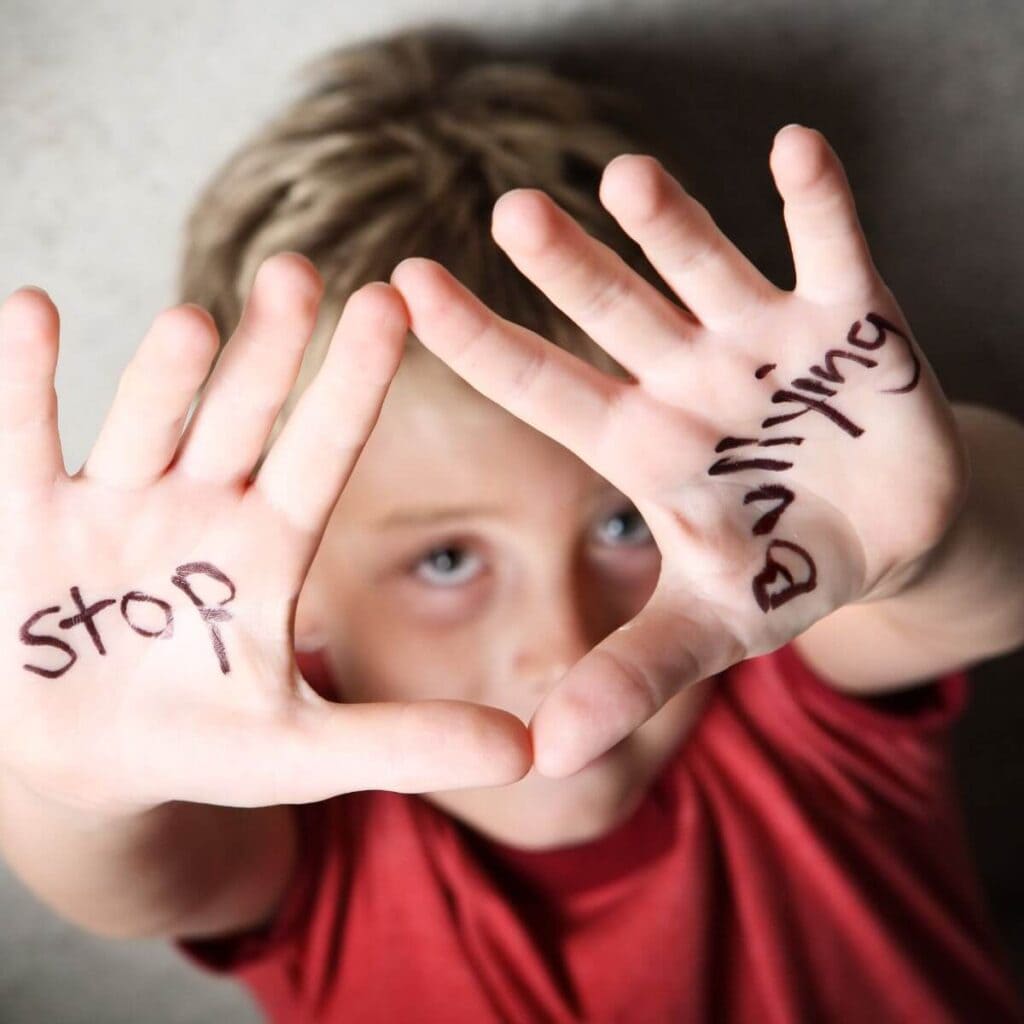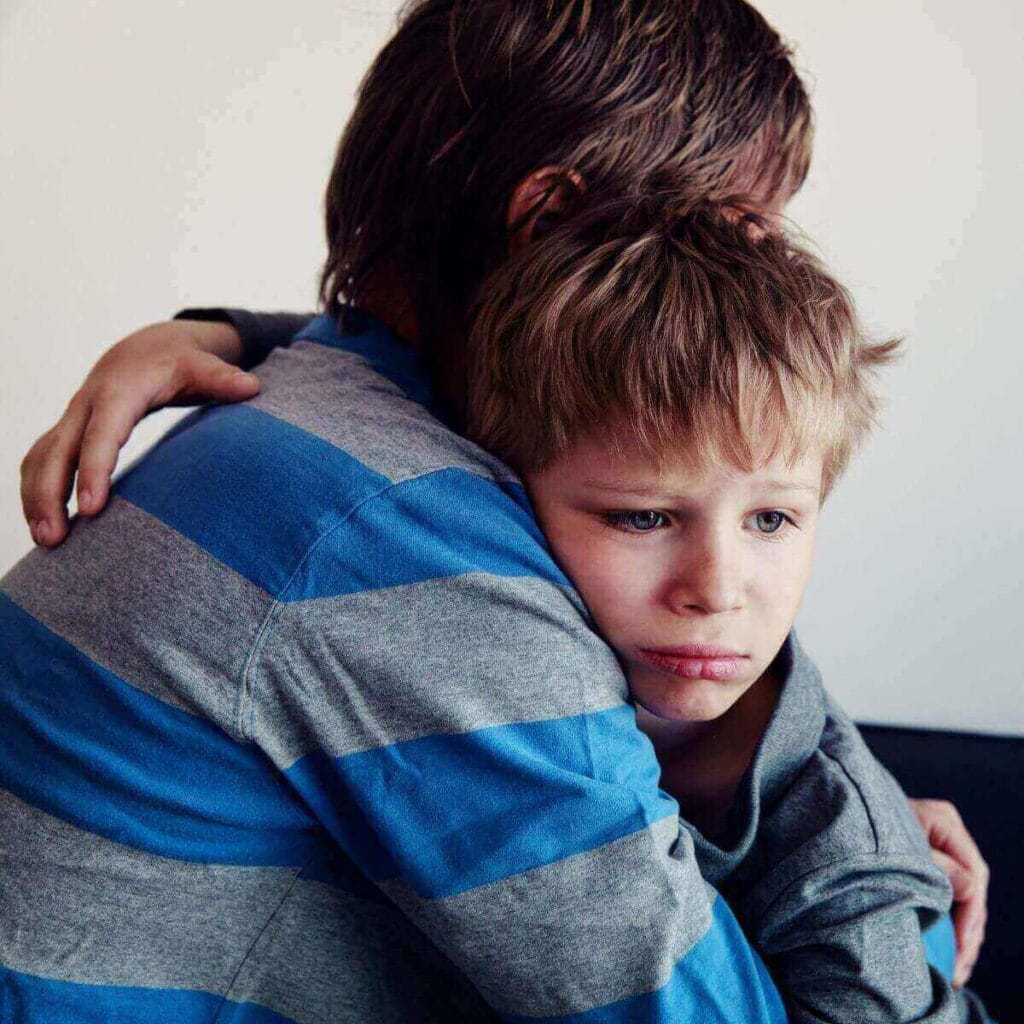Before I became a parent, there were certain things I expected to be a part of my child-rearing experiences; helping kids deal with bullies, however, was not one of them.
I anticipated long nights of diaper changes and breastfeeding.
I assumed there would be scraped knees and bumped elbows.
I even figured we’d deal with hurt feelings and big emotions from time to time.
I couldn’t have prepared myself for how early bullying would start in school, though. While I dealt with my fair share of bullies and school meanies, it seemed like there should be more time before the name-calling and ostracizing would begin.
Imagine our surprise when our daughter came home in kindergarten sobbing because one little girl told all the others not to play with her.
Yes, you read that correctly…KINDERGARTEN.
Our little one’s first “big girl” school experience was suddenly tainted with taunts of “you can’t sit with us,” and “you can’t play with us on the playground.”
My husband and I were heartbroken.
I faced a challenging question: how are we parents supposed to help our children handle bullies the “right” way?
You’re not alone if you’ve wondered what you can do to help your child confront their school bully or gain the confidence they need to stand up for themselves.
Luckily for all of us lost and confused parents, there are several great tips we all need to keep in our parenting guidelines. Check out the suggestions below if you think there’s a chance your little one has a bully.

This site contains affiliate links, meaning that we earn a small commission for purchases made through our site. We only recommend products we personally use, love, or have thoroughly vetted.
Is it Bullying or Just “Kids Being Kids?”
While even the slightest mean look or harsh word can send most of us parents into a rage, it’s crucial to step outside of the situation and consider one important question:
“Does my child have a bully, or is it a less severe situation?”
When I first heard comments from my daughter about her bully, I assumed she was just a kid with sore feelings about an elementary battle that didn’t go her way.
As the days went on and my little one came home sadder and sadder, I realized something more significant was going on.
It’s important not to jump to conclusions but also to make sure you know exactly what’s going on. Whether you have an elementary schooler or a high school teen, be on the lookout for signs your child is being bullied.
Signs Your Child Has a Bully
Sadness and getting easily upset might seem like obvious signs your child is getting bullied, but they’re not the only ones.
As kids grow, the signs of bullying might present differently than they would in younger children. That’s why we’re breaking down these indicators by age group.
Clues Your Young Child or Tween is Struggling with Bullying
Does your little one suddenly have more headaches or belly aches than before? Are they acting extra attached to their teacher at school?
Signs like these could represent a problem. Some of the most common physical and emotional hints there’s a bullying problem for your young child include:
- Not wanting to go to daycare or school
- Missing or stolen personal items
- Sudden bedwetting
- Feeling anxious or nervous (especially if this is out of character for them)
- Sitting alone at school
- Struggling with schoolwork
- Poor appetite
- Having trouble sleeping
- Mysterious bruises, cuts, or torn clothing
- Acting withdrawn
- Stories of sitting alone at recess or lunch
Indicators Your Teenager is Being Bullied
Figuring out whether your teen has a bully can be more challenging – especially since many teenagers tend to pull back from their parents as they age.
Pay close attention to any changes in your teen’s personality and look for signs like the ones below that there’s a problem:
- Acting anxious or unhappy before leaving for school in the morning
- Expressing hatred for school
- Trouble sleeping
- Increased social isolation
- Alcohol or drug use
- Sudden drop in grades
- Frequent complaints of stomach or headaches
- Unexplained physical injuries or torn clothes
- Low self-esteem
- Negative emotions after being online or using social media
- Changes in emotional state, including depression or anxiety

Handling Bullies in School
Once you’ve identified a possible bullying issue, the next step is determining how to help your child handle the situation.
If, for instance, your little one or teen has a bully at school, you’ll need to figure out the proper steps to overcome the problem. Below, you’ll find a few action items to help you navigate this challenging circumstance:
1. Try to Have a Conversation
Getting our children to open up about bullies is the first step in dealing with the problem. Depending on your son or daughter’s unique perspective, this may or may not be easy.
Start by asking leading questions to try and guide a conversation. These can include things like:
“Who do you like to hang out with at school?”
“What do you play on the playground?”
“Who do you sit with in the cafeteria?”
“Which classes do you love the most? The least?”
You want to get them talking about various aspects of their day to try and pinpoint where a situation might lie.
If you get them to open up about possible issues, you’ll want to sit back and listen closely to what they’re saying. Instead of overwhelming them with more questions or comparing the situation to something you’ve dealt with in the past, lend them your ear and pay attention to what they’re telling you.
After they finish talking, avoid the instinct many of us have to tell our children to fight back.
While we might want nothing more than to tell them to punch the bully in the nose, that’s not a productive approach.
Instead, let them know you’re proud of them for talking to you about the trouble, and tell them that you’ll help them devise a way to handle everything.
2. Reach Out to a Teacher, School Counselor, or Administrator
Often, schools have policies in place to protect students from bullies. The most straightforward solution might be to tell them there’s a problem and let them do their job.
Talking to school professionals is also a great way to confirm whether there is a problem or not. Your child’s school nurse, teacher, principal, or another staff member can keep a close eye on the situation and let you know what they find out.
3. Come Up With Problem-Solving Tactics for Your Child
While talking to your little one or teen and getting the school involved are perfect places to start, there are other options you have for helping kids deal with bullies at school. You can also suggest other solutions, such as:
- Stay Clear of the Bully: While this isn’t always a possibility, if there’s a way for your son or daughter to avoid the bully, this is an ideal first step in fixing the problem. Try a different bathroom, take another route to class, or ask for a classroom change – all of these are options. Your child can also use the buddy system when possible to avoid confrontations with their bully.
- Hold Their Emotions: I speak from experience when I say this is easier said than done, but it’s worth repeating anyway: work with your child on controlling their emotions. Unfortunately, many bullies only thrive when they see their victim crying, getting angry, or stressed. If your child can keep a straight face and remain calm during attacks, they’re removing power from the bully.
- Tell Them to Stop and Walk Away: Sometimes, the simplest things can impact the most. Have your child look at the bully, tell them to stop, and just walk away.
- Talk to Someone They Can Trust: With any hope, our children will always want to come to us with their problems. That’s only sometimes the case, though. Let your child know it’s okay to find someone they trust to discuss their bully trouble if they don’t want to talk to you about the person. This could be another relative, family friend, school official, etc.
How Can You Stop Bullying Online?
What if your child is experiencing aggressive behavior from an individual online? While many of us are used to the rumors, teasing, and negative behaviors that often happen in school hallways, they’re not the only type of bullying that happens these days.
Given the increased time we spend online, cyberbullying is more prevalent than ever.
Many of the above suggestions will work if you want to know how to help your children deal with cyberbullies. Consider the following options:
- Take an Interest in Their Online Life: It’s common for a decent chunk of our lives to take place in the digital world. Just as you would take an interest in any other area of your child or teenager’s life, get involved with what they’re doing online, too. Set up profiles for yourself and interact with your child on social media.
- Set Limits and Implement Parental Controls: If you want to know the best option for online bullying prevention, it’s likely to limit the amount of screen time your kids get. You can also put parental controls on their devices, which might be more challenging when you’re dealing with teens.
- Take Action Steps to Block the Cyber Bully: First, have your child stop responding to the bully. Then gather as much evidence of the online bullying as possible before your son or daughter blocks them completely.
- Report Cyberbullying: Whether you report the bully to online service providers the bully’s parents if you know them, or local police, it’s crucial to let someone know what’s happening.
Trustworthy Resources to Handle Bullying Behavior
One of the best first steps in helping kids deal with bullies is speaking with a guidance counselor or administrator. If these individuals can’t help, some other resources might offer valuable information and solutions:
- StopBullying.gov
- PACER’s National Bullying Prevention Center
- American Academy of Child and Adolescent Psychiatry
- Stomp Out Bullying
- The American Federation of Teachers
- SafeKids.com

Quick Ways to Help Build Your Child’s Confidence After Bullying
One of the most impactful techniques for helping a child or teenager being bullied is boosting self-confidence.
The Child Mind Institute created a list of 12 healthy ways to instill more confidence in our children. Some of the best suggestions they offer include:
- Try to act more confidently yourself – While there’s nothing wrong with acknowledging your imperfections, moms and dads should showcase the characteristics they want their children to learn.
- Allow your child to make mistakes without repercussions – Mistakes will happen; after all, none of us are perfect! Give your child the space to make those mistakes without coming down on them every time.
- Praise resilience – Recognize those moments when your child is struggling but perseveres through complicated challenges. Positive affirmations will stay with them.
- Set personal goals with your children – When we achieve a goal, no matter how small or big, we feel better about ourselves and what we’re capable of. Set small goals with your child to boost their sense of self.
- Be okay with failure – While sitting back and watching your child fail at something is enough to cause any of us some extra parenting stress, it also provides crucial life lessons. Everyone will fail at some point or another. By letting your child experience failures, they’ll realize it happens to everyone, and it’s not the end of the world.
In addition to tips like these, you can also introduce resources, such as empowering books for girls and boys, to enhance their self-confidence.
Stay Strong and Pay Attention to Your Child’s Experiences
All too often, we’re inundated with news headlines that stem from the repercussions of bullying. From school shootings to suicide, the danger of online and in-school bullies can be catastrophic.
In a perfect world, our sweet children would never experience the pain of having a bully. Unfortunately, approximately 20% of students report being bullied each year. It’s essential for us parents to learn the tools we need to help our children if situations like this arise.
If your child is experiencing bully, it’s time to get ahead of the problem. Instill them with as much self-confidence as possible and teach them the tools they need to overcome this challenge.
Do you have any experience helping kids deal with bullies? What worked for your family?










